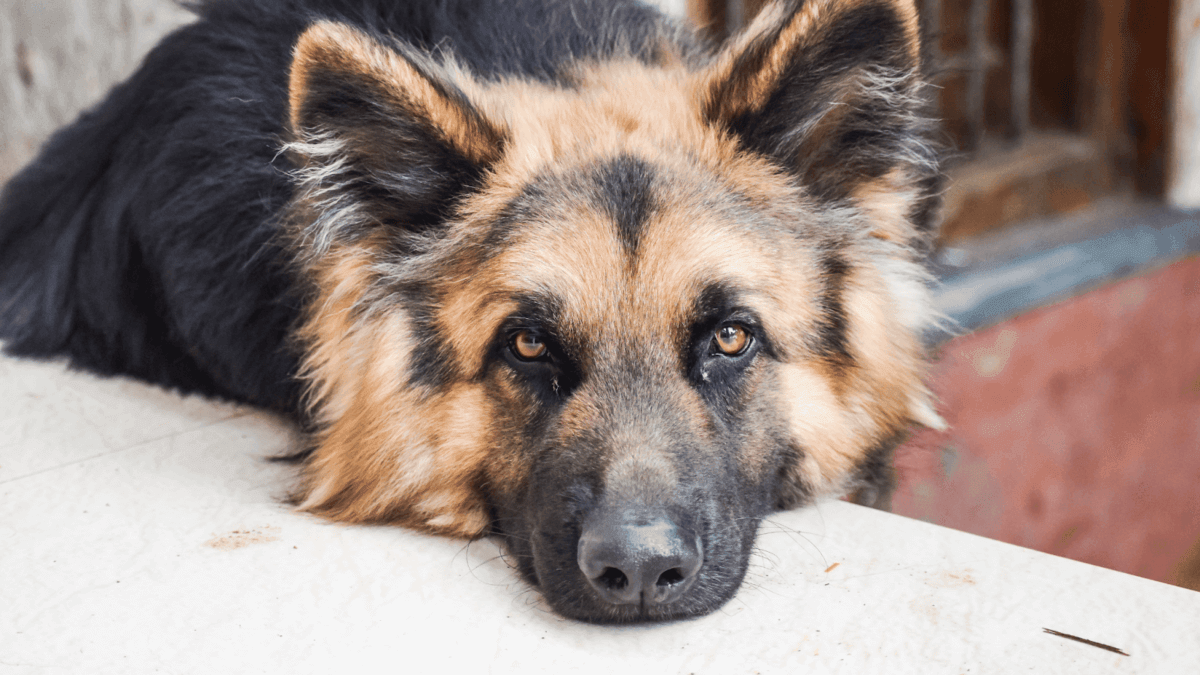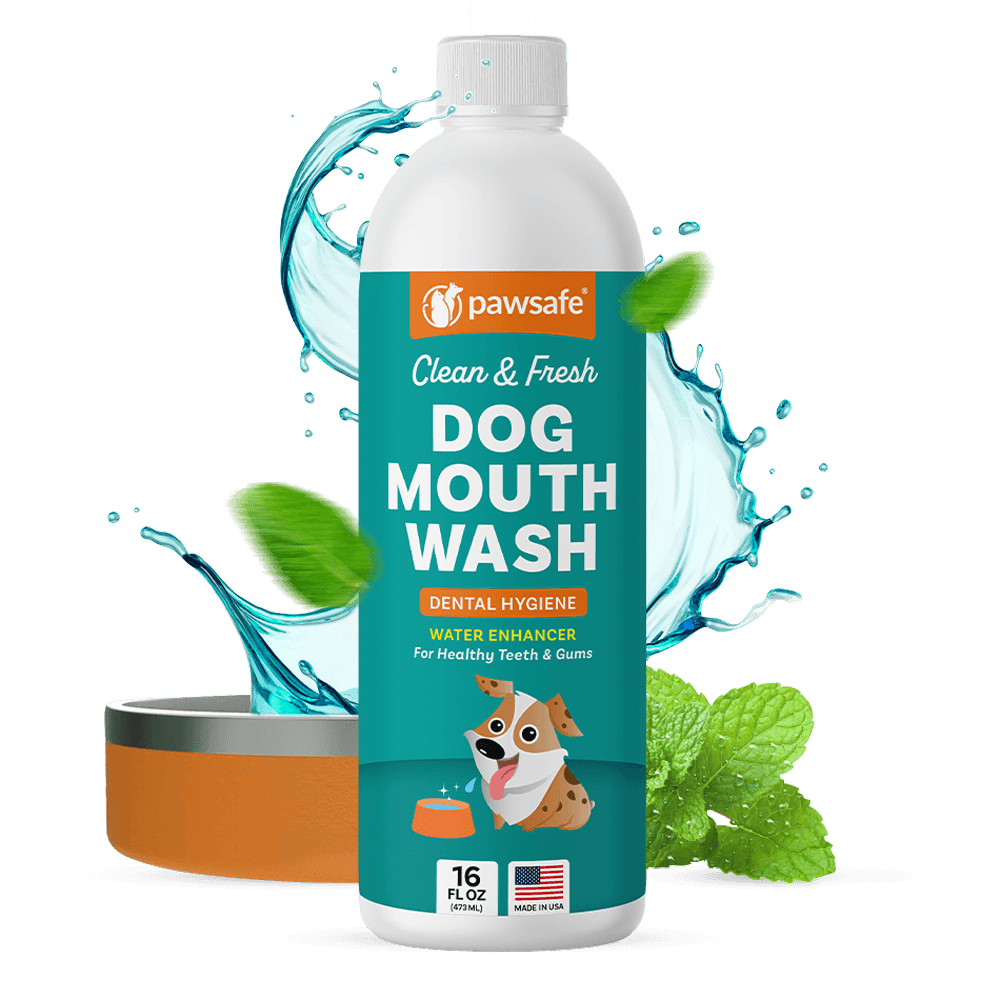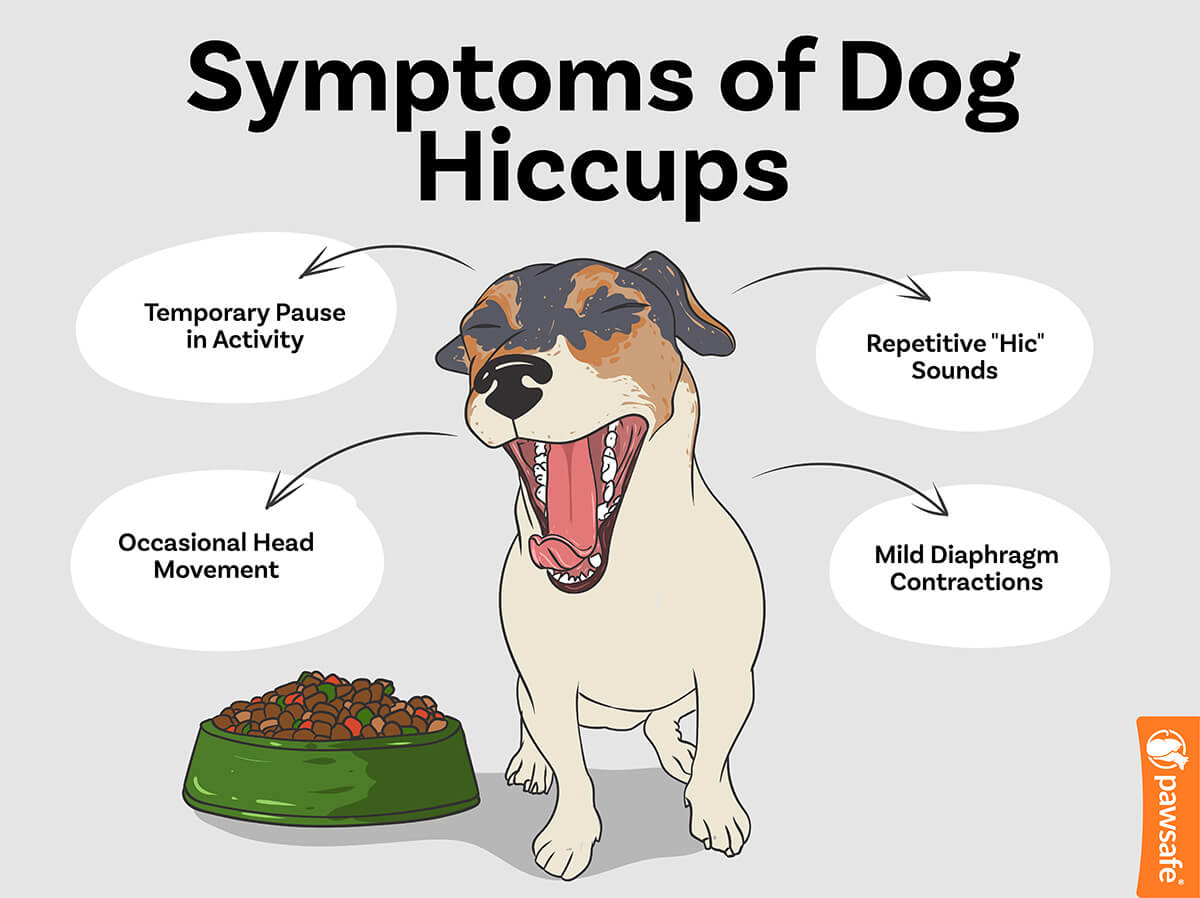
One thing that may leave owners scratching their heads is why dogs get hiccups. While hiccups are common in humans, many pet owners may wonder why their dog experiences them and if they should be concerned.
First and foremost, it is essential to understand that hiccups in dogs are typically harmless and not a cause for alarm. Your dog may just have eaten or drunk from their bowls too fast or gotten too excited. In some cases, letting them eat from a doggy snuffle mat is enough to slow them down and avoid the hiccups.
If a dog experiences hiccups, it is generally best to let them run their course. However, if hiccups persist for an extended period or accompany symptoms like vomiting or difficulty breathing, it’s best to call the vet. With the help of expert advice and academic sources[1], let’s get into all about dog hiccups.
Table of Contents
So, Why Do Dogs Get Hiccups?
Hiccups occur when the diaphragm muscle contracts involuntarily, causing a sudden intake of breath that is then cut off by the closure of the vocal cords, causing the hic sound. While the exact cause of hiccups in dogs is unknown, it is believed that they may result from excitement, stress, or even eating or drinking too quickly.
In some cases, hiccups can be a sign of an underlying medical condition. For example, if your dog is experiencing chronic hiccups, it could be a sign of gastrointestinal issues or respiratory problems.
Hiccups have been studied[2] much more extensively in cats, showing that hiccups are the body’s attempts to remove air from the stomach. However, unlike issues like stumbling, wheezing, or excessive coughing, hiccups are way less worrisome.
Overall, hiccups in dogs are usually harmless and nothing to worry about. However, if you notice your dog has hiccups frequently or for an extended period, it’s best to consult with your veterinarian to rule out any underlying health issues.
9 Common Causes of Dog Hiccups

Dog hiccups are a common occurrence that most pet owners have experienced. Although hiccups are usually harmless and a bit hilarious, they can still be a sign of an underlying health issue.
Research shows that there are three types of hiccups. Transient hiccups (episodes lasting seconds or minutes), persistent hiccups (longer than 48 hours), and recurrent hiccups (keep coming back).
The study also shows that the causes of the harmless, transient hiccups are largely unknown (idiopathic). However, severe hiccups[3] often indicate Vagus or phrenic nerve irritation or even stroke.
Here are nine common causes of dog hiccups:
1. Excitement and Stress
Dogs can get hiccups when they are excited or stressed. This is because excitement and stress can cause rapid breathing, which can lead to hiccups. This is more common in dogs that are prone to anxiety.
2. Eating and Drinking Habits
One of the most common reasons for dog hiccups is eating or drinking too quickly. When dogs eat or drink too fast, they swallow air, which can lead to hiccups. This is especially common in puppies who are still learning how to eat and drink properly. Understanding other oral behaviors can help you recognize normal vs concerning mouth-related activities.
3. Puppyhood
Puppies are more likely to get hiccups than adult dogs. This is because their bodies are still developing, and they are still learning how to control their breathing and swallowing.
4. Nerve Aggravation
Sometimes, hiccups can be caused by nerve aggravation. This can happen when a dog’s diaphragm muscle becomes irritated, which can cause the muscle to spasm and lead to hiccups.
5. Gastrointestinal Problems
Studies[4] show hiccups can also be a sign of gastrointestinal problems, such as acid reflux or gastroesophageal reflux disease (GERD), gastritis, pancreatitis, inflammatory bowel disease, and bowel obstruction. These conditions can irritate the diaphragm muscle, which can lead to hiccups.

Fresh Breath The Easy Way
Just add to the water bowl to support cleaner mouths and noticeably fresher breath without daily brushing struggles.
Shop Now 👉Fresh Breath Guarantee • 90-Day PawSafe® Promise
6. Temperature Changes
Sudden temperature changes can also cause hiccups in dogs. For example, going from a warm room to a cold room can cause hiccups in dogs.
7. Breathing Problems
Hiccups can also be a sign of breathing problems, such as asthma or bronchitis. If your dog’s hiccups are accompanied by coughing or difficulty breathing, you should immediately take them to the vet.
8. Central Nervous System Disorders
Conditions such as brain stem issues, lesions, or tumors can interfere with the neurological signals that regulate breathing and diaphragm contractions, potentially resulting in hiccups.
Consult your vet immediately if your dog experiences persistent or severe hiccups, especially alongside other neurological symptoms like coordination problems or changes in behavior.
9. Metabolic Issues
Metabolic issues can contribute to dog hiccups by affecting the body’s normal physiological processes. For instance, electrolyte imbalances, such as potassium and calcium, can disrupt nerve and muscle function, including the diaphragm’s rhythmic contractions.
Additionally, conditions like kidney dysfunction or diabetes may lead to metabolic imbalances that trigger hiccups. Persistent hiccups, alongside signs like excessive thirst, urination, or lethargy, could suggest metabolic issues.
Symptoms of Dog Hiccups

When a dog has hiccups, the symptoms are usually quite obvious. The dog may make a repeated “hic” sound caused by a sudden diaphragm contraction. A brief pause in breathing and a quick inhalation may quickly follow. Some dogs may also show other signs of discomfort, such as restlessness or an inability to settle down.
Here are some common symptoms of dog hiccups:
- Repeated “hic” sound;
- A brief pause in breathing;
- Quick inhalation; and
- Restlessness or inability to settle down.
It is important to note that these symptoms can also indicate other health issues, so it is essential to consult with a veterinarian if you notice any changes in your dog’s behavior or health.
When to Worry About Dog Hiccups
Duration of Hiccups
In most cases, dog hiccups are harmless and will go away alone within a few minutes. However, if your dog’s hiccups last for an extended period, it may indicate an underlying health problem. If your dog’s hiccups persist for over an hour, it’s best to consult a veterinarian.
Associated Symptoms
While dog hiccups are usually harmless, they can be a symptom of an underlying health issue. If your dog experiences any of the following symptoms along with hiccups, it’s best to seek veterinary care:
- Difficulty breathing;
- Coughing;
- Vomiting;
- Loss of appetite; and
- Lethargy.
These symptoms could indicate a more severe health issue, such as respiratory problems or gastrointestinal issues. It’s essential to monitor your dog’s health and seek veterinary care if you notice any concerning symptoms.

Daily Water Additive For Oral Freshness
Helps maintain better breath and oral hygiene as your dog drinks, keeping cuddle moments pleasant.
Shop Now 👉Fresh Breath Guarantee • 90-Day PawSafe® Promise
How to Stop Dog Hiccups
Relaxation Techniques
If your dog is experiencing hiccups, it may be due to stress or anxiety. One way to help stop dog hiccups is to use relaxation techniques. Here are a few things you can try to stop hiccups fast:
- Massage: Gently massaging your dog’s back and belly can help calm them down and ease their hiccups.
- Relax and calm your dog to show them hiccups are normal.
- Allow the hiccups to pass.
- Offer your dog some water or dog beverages like broth, coconut water, or dilute fruit juice.
- Others claim a teaspoon of peanut butter, unsweetened maple syrup, or honey can help by coating the dog’s throat.
Change in Diet
Another possible cause of dog hiccups is a change in diet. If you recently switched your dog’s food or treats, their digestive system may struggle to adjust. Here are some tips for preventing and stopping hiccups caused by diet:
- Slowly transition to a new food: If you’re changing your dog’s food, do it gradually over a week or two to give their digestive system time to adjust.
- Avoid table scraps: Human food can be difficult for dogs to digest and may cause hiccups. Stick to high-quality dog food and treats.
- Feed smaller, more frequent meals: Instead of feeding your dog one or two large meals a day, try feeding them smaller, more frequent meals to help aid digestion.
Remember, if your dog’s hiccups persist or accompany other symptoms, such as vomiting or difficulty breathing, it’s essential to consult your veterinarian to rule out any underlying health issues.
Preventing Future Hiccups
Regular Exercise
One way to prevent future hiccups in dogs is by ensuring that they get regular exercise. Exercise helps to keep the dog’s body healthy and functioning correctly, which can help to prevent hiccups from occurring. Regular exercise can also help to reduce stress and anxiety, which are common causes of hiccups in dogs.
Some ways to incorporate regular exercise into a dog’s routine include taking them for daily walks, playing with them in the backyard, or taking them to a local dog park. The amount of exercise needed will vary depending on the dog’s breed, age, and overall health.
Proper Feeding Schedule
Establishing a proper feeding schedule is another way to prevent future dog hiccups. Feeding a dog at regular intervals throughout the day can help prevent hiccups. This is because overeating or eating too quickly can cause hiccups in dogs. Some dogs also exhibit teeth chattering behaviors related to excitement or anticipation around feeding time.
It’s essential to determine the appropriate amount of food for your dog based on their age, breed, and overall health to establish a proper feeding schedule.
Once you determine the appropriate amount of food, it can be divided into several small meals throughout the day to prevent overeating and hiccups.
Frequently Asked Questions (FAQs)

Turn Plain Water Into Breath Support
A simple routine that supports a cleaner mouth and fresher kisses over time—no messy brushing required.
Shop Now 👉Fresh Breath Guarantee • 90-Day PawSafe® Promise
How can I stop my dog’s hiccups?
Unfortunately, there is no guaranteed way to stop your dog’s hiccups. However, you can give them a small amount of water, massage their chest, or distract them with a toy or treat.
Why does my puppy get hiccups at night?
Puppies, like humans, can get hiccups for a variety of reasons. It could be due to overeating or drinking too quickly, excitement, or even stress. Hiccups at night may also result from your puppy’s sleeping position or breathing patterns.
Why does my dog get hiccups in the morning?
Hiccups in the morning are often caused by an empty stomach or excitement from seeing you. If your dog is experiencing hiccups in the morning, try feeding them a small meal or snack to see if it helps.
What do dog hiccups look like?
Dog hiccups look similar to human hiccups – a quick, involuntary diaphragm contraction that causes a sharp inhale of air. Your dog may also make a small noise or movement when they hiccup.
Should I be worried if my dog is hiccuping?
In most cases, dog hiccups are harmless and will go away on their own. However, if your dog is experiencing frequent or prolonged hiccups, it could indicate an underlying health issue. It’s always best to consult with your veterinarian if you have concerns.
Why does my puppy get hiccups so much?
Puppies are more prone to hiccups than adult dogs due to their developing diaphragms and digestive systems. It’s normal for puppies to get hiccups frequently, and they usually outgrow this as they age. If you’re concerned, talk to your veterinarian.
Final Thoughts
Hiccups in dogs are typically harmless and often go away on their own. However, if your dog experiences persistent hiccups or shows other signs of discomfort, it’s essential to consult a veterinarian to rule out any underlying health issues.
While the exact cause of hiccups in dogs is not fully understood, several factors may contribute to their occurrence, including eating too quickly, stress, excitement, and gastrointestinal issues.
References
- Hiccups: a common problem with some unusual causes and cures. PMC. https://www.ncbi.nlm.nih.gov/pmc/articles/PMC5072913/
- Hiccup reflex is mediated by pharyngeal branch of glossopharyngeal nerve in cats. ScienceDirect. https://www.sciencedirect.com/science/article/abs/pii/S0168010203002256
- Alimentary Pharmacology & Therapeutics | Pharmacology Journal. Wiley. https://onlinelibrary.wiley.com/doi/full/10.1111/apt.13374
- Hiccups - Digestive Disorders - MSD Manual Consumer Version. Msdmanuals. https://www.msdmanuals.com/home/digestive-disorders/symptoms-of-digestive-disorders/hiccups#v55589951







